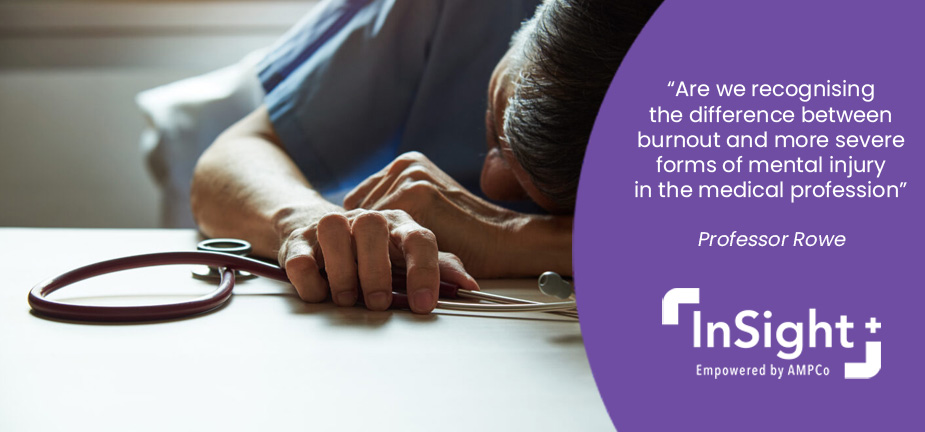This inSight+ article, authored by Clinical Professor Leanne Rowe AM is the second opinion piece in a three-part series that calls for further action by a united medical profession to address the enormous scale of work-related burnout and mental injury in doctors who work in psychologically unsafe health care workplaces. There are solutions.
‘Every doctor can recover from work-related mental injury’ (inSight Article Extract)
When a 24-year-old labourer’s apprentice used a chainsaw without training, they sustained a jagged laceration through their left quadriceps. When I saw them 12 months later in my general practice, their laceration was well healed. However, they remained unemployed because their untreated post-traumatic stress disorder (PTSD) was aggravated on their return to work when their boss put a chain saw in their hands to help them “toughen up and get over it”.
Clearly, the apprentice’s severe mental injury was contributed to by the failure of his employer to provide adequate training and support. The young man’s surgeons carefully attended to his physical injury, but underestimated his mental illness when they certified him fit for pre-injury duties in an unsafe workplace.
There are striking parallels in this case with the way the medical profession sometimes underestimates acute and repetitive work-related mental injury in doctors who work in psychologically unsafe health care workplaces, particularly in its own apprentices.
In recent times, major global and national issues have plunged our health system into chaos and resulted in a major mental health crisis in our communities, and our health workers, including the medical profession. And yet, in the wake of a pandemic and other multiple disaster exposures (here), there seems to be a tendency in medicine to “just want to put it all behind us”. Have we considered that responses such as “I don’t want to talk about it”, “it’s just part of the job” or “toughen up, get over it” may be symptoms of unhealthy avoidance following multiple traumatic experiences?
Are we recognising the difference between burnout and more severe forms of mental injury in the medical profession, asks Professor Rowe.
Continue Reading the Full Article on the inSight+ website. >>
PLEASE NOTE: On Monday Oct2, the final part in this three-part series in MJA Insight Plus will discuss ways every doctor can cocreate a psychologically safe health workplace. If this opinion piece has triggered any discomfort, please make a long consultation with your independent and trusted general practitioner, the DRS4DRS program, or the Doctors’ Health Alliance to talk about recovery from burnout and work-related mental injury
by Clinical Professor Leanne Rowe AM
25 Sept 2023
(Credits: Article- inSight+ / Stock-Teeradej / Shutterstock)
Clinical Professor Leanne Rowe AM is a rural GP and co-author of the 2nd edition of Every Doctor: healthier doctors = healthier patients. Her Doctor of Medicine thesis is on the topic of GP mental health training, and she was a past Chairman of the Royal Australian College of General Practitioners and Deputy Chancellor of Monash University.

